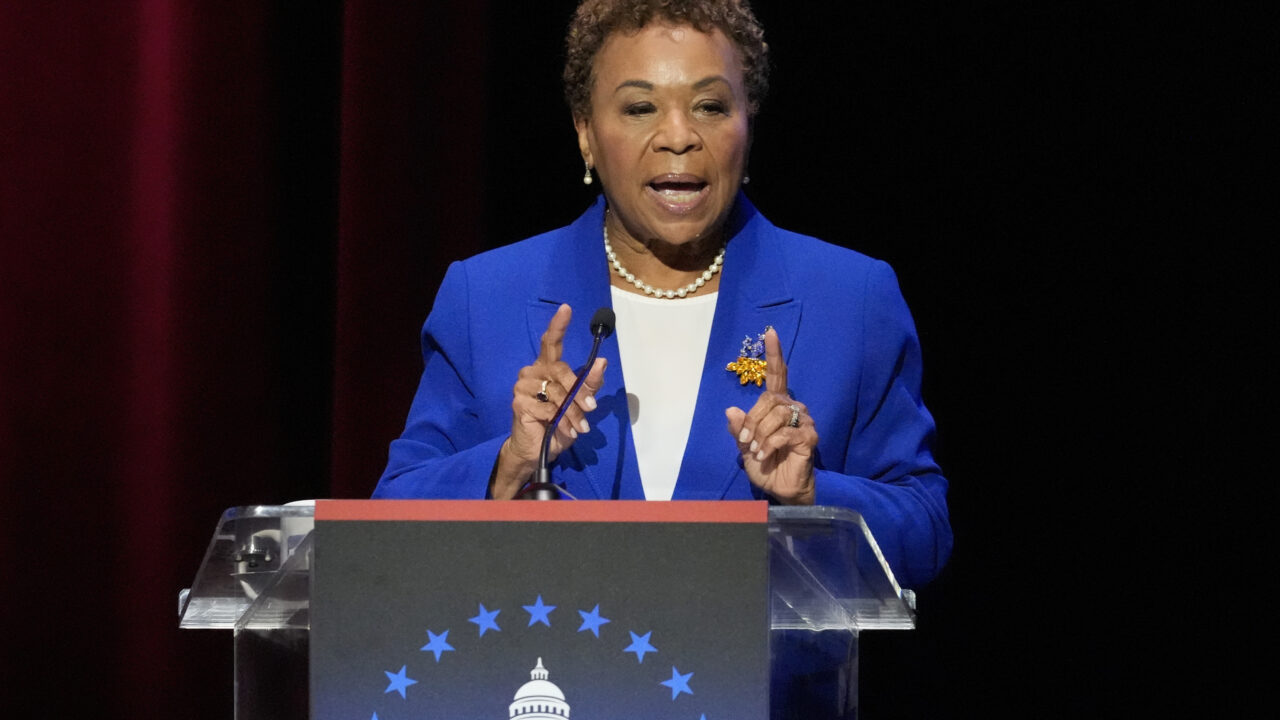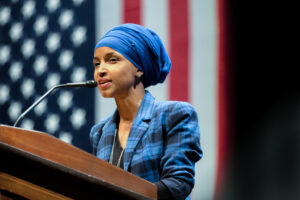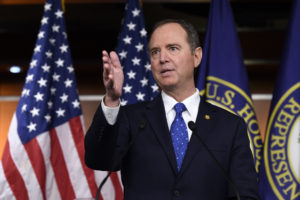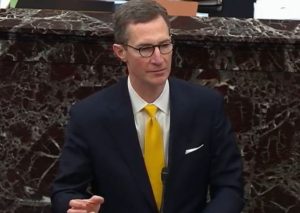Will California Send Barbara Lee to the Senate?
The Black progressive from Oakland carved out space for others to follow, including the Squad. Rep. Barbara Lee, D-Calif., speaks during a televised debate for candidates in the senate race, Jan. 22, 2024, in Los Angeles. (AP Photo/Damian Dovarganes, File)
Rep. Barbara Lee, D-Calif., speaks during a televised debate for candidates in the senate race, Jan. 22, 2024, in Los Angeles. (AP Photo/Damian Dovarganes, File)
When Barbara Lee was a student at the all-women Mills College in the early 1970s working toward a psychology degree, a class assignment presented her with a dilemma.
The course required students to get involved in a 1972 presidential primary campaign. Lee was a budding activist, president of the Black Student Union and volunteer for the Oakland-founded Black Panther Party. She didn’t see a role for herself in mainstream politics — she wasn’t even registered to vote. She was a single mother with two young sons to support, bracing to flunk a class rather than work to elect one of the leading candidates who didn’t, or couldn’t, talk about the world in the way Lee experienced it.
Then, she met Shirley Chisholm.
Lee, 77, is currently competing in what many might characterize as a long-shot bid of her own: a campaign for the U.S. Senate that is the culmination of her decades-long political career.
Lee had invited Chisholm, the first Black woman elected to the U.S. Congress, to speak to the Black Student Union without knowing that Chisholm had just launched a long-shot presidential bid. Lee listened to Chisholm explain that her campaign was about being an “unbought and unbossed” catalyst for change. It thrilled Lee to see a Black woman in national politics who was an outspoken opponent of the Vietnam War, who centered her work on women’s rights and racial equity. At Chisholm’s insistence, Lee registered to vote. At Chisholm’s suggestion, she started volunteering for her White House campaign.
“I was a single mother on public assistance, food stamps, with no money for child care — I had to take my little boys to class with me. Nobody, no elected official for the most part, was speaking to those issues until I met Shirley Chisholm, who convinced me that I needed to have a seat at the table, needed to get involved, needed to register to vote,” Lee told The 19th.
Lee, 77, is currently competing in what many might characterize as a long-shot bid of her own: a campaign for the U.S. Senate that is the culmination of her decades-long political career. It began when she ran Chisholm’s campaign in Northern California for her class project — Chisholm lost the nomination, but got enough votes that Lee and some fellow volunteers went to the convention as her delegates. Then-Rep. Ron Dellums, a staunch anti-war activist from Oakland, noticed Lee’s work for Chisholm, and hired Lee in his U.S. House office. Then, he encouraged her to run for the state legislature. When Dellums retired in 1998, Lee ran for Dellums’ seat with his blessing. Like her former boss and mentor, Lee has now represented the Oakland-area House district for 13 terms, winning both her primaries and general elections by 50- to 80-point margins.
At every stop along the way, Lee has made it a point to do for others what Chisholm and Dellums did for her. She has pulled seats up to the table for budding public servants, often women or people of color or both. Lee has offered advice, direction, counsel. She has shown what it looks like to have a Black woman in the room during key debates about public spending, war and peace. Her campaign slogan, “Barbara Lee speaks for me!” was crafted not by a political consultant but by then students at her alma mater Mills College.
California’s crowded Senate race
Lee is one of three House Democrats competing for the seat formerly held by Democrat Dianne Feinstein, who before her death in September 2023 was the longest-serving woman senator in history.
Rep. Katie Porter was the first to enter the race in January 2023, saying it was time for new leadership. Rep. Adam Schiff quickly followed, saying democracy was at risk. Then, once Feinstein announced in February that she would retire when her term ended, Lee launched her bid.
Then, Feinstein died.
She has shown what it looks like to have a Black woman in the room during key debates about public spending, war and peace.
California Gov. Gavin Newsom, also a Democrat, had pledged to appoint a Black woman to replace Feinstein if the ailing senator could not complete her term. The number of Black women in the upper chamber had dropped to zero when now-Vice President Kamala Harris left, and Newsom’s pick to replace her was Alex Padilla, who became the first Latinx senator to represent the state. Lee’s allies, including the Congressional Black Caucus, pressured Newsom to appoint her as Feinstein’s replacement. He demurred, saying he did not want to choose someone who was already in the race. Several days after Feinstein’s death, Newsom announced that Laphonza Butler would fill the seat until a special election could be held.
Now all three House lawmakers are competing in two Senate primary races. One is to finish the last bit of Feinstein’s term, from after the November elections until the new Congress begins in January. The other, the main race, is for a full six-year term. Voters could pick the same candidate, or different candidates, in the parallel elections.
California has a top-two primary system for Senate seats, which means that the two candidates who get the most votes Tuesday will advance to the general election irrespective of their party. Opinion polls show a race that has remained mostly static: Schiff leads with about 25 percent of the vote; Porter is essentially tied for second with Republican former professional baseball player Steve Garvey, each with somewhere between 16 to 19 percent of the vote; and Lee rounds out the top tier with support from about 9 percent of likely primary voters.
Schiff, 63, is the Democratic establishment candidate, with a strong fundraising position thanks to a national profile built by managing former President Donald Trump’s first impeachment trial and serving on the special committee that investigated the insurrection at the U.S. Capitol. He has snagged endorsements from high-profile California Democrats that include Rep. Nancy Pelosi, the first woman U.S. House speaker, and former Sen. Barbara Boxer, who was elected in 1992 with Feinstein.
Porter, who at 50 is the youngest of the top-tier candidates, is a bankruptcy expert and law-professor-turned-lawmaker. After flipping her Orange County district for Democrats in 2018, Porter’s assertive grilling of corporate executives presented made-for-TV moments to cable news outlets and late-night television hosts. Part of Porter’s pitch is that as a divorced mother of three school-aged kids, she is keenly attuned to how the leadership of her party will impact the next generation of voters. Her endorsers include Sen. Elizabeth Warren, her former law school professor and mentor, and a suite of labor groups.
She was the sole member of the 535-member Congress to cast a “no” vote against authorizing the use of military force after the September 11, 2001 terrorist attacks.
Then there is Lee, a legislative workhorse in the Democratic Party’s left wing. She is a progressive Black woman who came to Congress when there weren’t enough lawmakers like her to form a “Squad” for support. She was the sole member of the 535-member Congress to cast a “no” vote against authorizing the use of military force after the September 11, 2001 terrorist attacks. She is the author of California’s Violence Against Women Act, and someone who believes the phrase “domestic violence” is a euphemism for what should be considered a hate crime. She helped develop a U.S. program to combat HIV and AIDS worldwide that is credited with saving at least 25 million lives. She is a party stalwart who is still an outsider. She is a woman who launched her Senate campaign by noting that even after decades in politics, “no one is rolling out the welcome mat, especially for someone like me.” Gen Z for Change and Reproductive Freedom for All, formerly known as NARAL, are among the groups that have endorsed her.
California, with its vast geography and big-city media markets, is one of the most expensive places in the country to run a statewide campaign. As of mid-February, Schiff’s Senate campaign had raised more than $31 million and Porter had raised nearly $17 million, compared with Lee’s $4.8 million.
The X factor
Though the contours of the California Senate race are mostly set, there is an X factor: A relatively large group of voters remains up for grabs, with polling showing up to 17 percent of likely primary voters still haven’t settled on a candidate. Plus, experts say there could be historically low turnout Tuesday, given that the presidential nominating contests were all but decided before they began, and Democratic voters aren’t enthusiastic about President Joe Biden at the top of the ticket.
Working against Lee is that her Senate candidacy has coincided with a national political conversation about how old is too old to serve — driven by the fact that either Biden or Trump would be the oldest-ever president elected. Working in her favor is a Democratic Party that has been roiled by Biden’s handling of the Israel-Hamas war and its devastating effects on Palestinian civilians, with the most disapproving voters being young, women, people of color or a combination.
Though Schiff, Porter and Lee have voted the same way in Congress 94 percent of the time, the issues on which they most disagree are foreign policy, the military and immigration, the San Francisco Chronicle concluded after analyzing their House records.
One of the clearest differentiators has been their responses to the Israel-Hamas war. Lee called for a cease-fire the day after Hamas’ brutal October 7 attack on Israeli civilians as the U.S. ally prepared a counter assault on Hamas militants in the Gaza Strip. Porter took a measured approach, saying in mid-December that she supports “working towards a lasting bilateral cease-fire in Gaza.” Schiff has not called for a cease-fire.
A relatively large group of voters remains up for grabs, with polling showing up to 17 percent of likely primary voters still haven’t settled on a candidate.
People in Lee’s orbit believe that her stances could boost her with the types of Californians who might not be captured in surveys of likely primary voters. Lee herself wasn’t a likely voter in 1972 — until she encountered a like-minded member of Congress who reflected her experience. She gets how young progressive voters feel.
“I understand very clearly where they are, and it’s not that they’re apathetic — I was not apathetic. It was just that I did not believe that the government was delivering for me, Democrats or Republicans,” Lee said. “I have had the privilege to listen and learn from young people and I tell them: I see myself in them.”
Whether they see themselves in her could determine Lee’s Senate prospects.
Lee’s campaign’s theory of the race is that it is far less baked than opinion polls suggest and a top-two finish is possible. Among the data points they cite are that in recent primary elections, Bay Area voters turned out at higher rates than in the Southern California counties where Schiff and Porter reside. Her organizing team includes a campaign manager and other political staff who worked for Sen. Bernie Sanders during his 2020 presidential campaign, when he won the California primary. Plus, Lee has the backing of Our Revolution, an organizing group that grew from Sanders’ 2016 White House bid.
Lee’s campaign, through its partnership with Our Revolution, has made about 2 million phone calls and texts. They have surpassed internal identified voter target numbers and, heading into the final days of the primary race, aim to turn out tens of thousands of those Californians.
Lee pointed out during a recent breakfast with Bay Area faith leaders of color that this type of grassroots organizing is “how you win elections,” citing the successful Los Angeles mayoral campaign of Karen Bass — the first woman and second Black person in the role, who previously served alongside Lee in the House — whose real-estate developer opponent had $100 million to burn in the race.
Before the ‘Squad,’ there was the ‘Triad’
To those outside of California — and to many voters within the state — Lee is best known for her 2001 vote against the Authorization for Use of Military Force and for her attempts to repeal it every Congress since. The vote occurred less than a week after the September 11 attacks and just several years after Lee was elected to the House.
On the morning of the attacks, Lee emerged from a breakfast with other members of the Congressional Black Caucus to find out that a plane had hit the World Trade Center. Her chief of staff’s cousin was a flight attendant on the plane that crashed in Pennsylvania. Phone lines were so jammed that she could not reach her family back in California. The Capitol was evacuated and Lee fled on foot until she encountered a Democratic colleague who lived nearby.
Lee didn’t know what she planned to do going into the vote; she nearly skipped a memorial service at National Cathedral to figure it out. Instead, she boarded the bus taking lawmakers across town at the last minute. There, she listened to Rev. Nathan Baxter, a friend of Archbishop Desmond Tutu, who worked to end apartheid in South Africa, as he prayed “for the divine wisdom as our leaders consider the necessary actions for national security, wisdom of the grace of God, that as we act, we not become the evil we deplore.”
When Lee returned to the Capitol she called her former boss, Dellums, who advised her on the potential ramifications of a “yes” or “no” vote. She considered her military family. She thought about Black leaders who had previously stood for caution and peace. She listened to her colleagues’ floor speeches. She jotted down some notes.
To those outside of California — and to many voters within the state — Lee is best known for her 2001 vote against the Authorization for Use of Military Force and for her attempts to repeal it every Congress since.
When it came time to give her own speech, Lee made the case for a “no” vote. “Some of us must urge the use of restraint. There must be some of us who say, ‘Let’s step back for a minute and think through the implications of our actions today, let us more fully understand the consequences,’” Lee said before closing with a paraphrase of Baxter’s prayer for wisdom.
“Then, it was the moment of truth. The bells rang, votes were cast, and the board was full of green lights. There was only one red one,” Lee wrote in a 2008 memoir. “My vote against giving the Bush administration a ‘blank check’ to use force after 9/11 didn’t feel momentous — just morally, ethically, and constitutionally correct. It never occurred to me that I would be the only one voting against it.”
Several years later, she worked with Rep. Maxine Waters, a Black woman who represented a Los Angeles-area district, and Rep. Lynn Woolsey, a White woman who represented a Northern California district, to create the Out-of-Iraq Caucus. Woolsey named them the “Triad.”
Lee’s willingness to take stands has inspired other progressive women of color, including members of the “Squad” who were voted into the House in 2018 and after.
“We often refer to her as ‘OG Squad,’” said Rep. Ayanna Pressley of Massachusetts. “We could not do what we do — show up fully, authentically, unapologetically — if Barbara Lee hadn’t kicked that door down and verbally hadn’t broken those concrete ceilings.”
Even before arriving in Washington and getting the chance to work with Lee directly on shared interests such as abortion access and alleviating poverty, Pressley said she “felt mentored by her example.”
Lee has fought for the repeal of the 1976 Hyde Amendment, which prohibits the government-run Medicare and Medicaid programs from covering abortion services, since she was a congressional staffer. With abortion rights under full assault, she has started to speak publicly about her own abortion as a teenager, when it was illegal, and she had to travel to Mexico with her mother’s friend. Hyde repeal is part of the Democratic Party’s platform now, but it wasn’t for many years — Biden, for example, was a holdout until early in his presidential campaign. His 2022 budget blueprint called for a full repeal. Pressley recalled how Lee, who co-chairs the Pro-Choice Caucus, vouched for her leadership on reproductive rights. Pressley now chairs the caucus’ Abortion Rights and Access Task Force.
Pressley also explained how Lee was the “first Black person that got me to understand the Black community globally,” given her work as a three-time representative at the United Nations General Assembly, her push to end a travel ban on people with HIV or AIDS from entering the country, and meetings she had about the genocides in Rwanda and Darfur with world leaders.
When Pressley visited the United Nations for the first time, with Lee as her guide, she said she “walked into the U.N. with my head held high, my back straight, taking up all kinds of space, because this Black woman, Barbara Lee, was already doing that, and it gave me permission to do the same thing.”
Barbara Lee’s legacy
That a highly popular Black woman lawmaker representing a progressive House district in a liberal state with decades of legislating under her belt has from the start of her Senate campaign been portrayed as an underdog reveals something about the electorate, the news media, or both — not that Lee seems surprised.
At the California Democratic Party’s convention late last year, while none of the three candidates cleared the 60 percent threshold for an endorsement, Lee led both Schiff and Porter — yet the de facto victory was described by Politico’s California bureau chief as Lee “losing the Democratic Party endorsement.”
“The goal post is ever-shifting for Black women,” said Lee campaign spokesperson Erica Dumas, herself a Black woman.
Lee has fought for the repeal of the 1976 Hyde Amendment, which prohibits the government-run Medicare and Medicaid programs from covering abortion services, since she was a congressional staffer.
At the recent breakfast with faith leaders, one topic of conversation was a television ad run by Schiff in which debate footage of Lee is used to attack Garvey for being a two-time Trump voter and how it could play to the trope of the angry Black woman in a way that might drive Republican voters to the polls. Another was the San Francisco Chronicle’s Senate primary endorsement. Lee was lauded as a “trailblazer” and commended for her work across the aisle to introduce the Rape Kit Backlog Progress Act. The writers praised how “the lessons she learned from her life experiences are reflected in her policy ideas, most notably on housing and homelessness,” an issue that dominated the race. Then, after describing Porter’s debate performances as “disappointing” and her housing plan as “pragmatic” but not as ambitious, Lee’s hometown newspaper endorsed Porter, saying she was “overflowing with ideas and energy.”
“It’s an example of White privilege,” Lee told the faith leaders, urging them to read the endorsement.
It is not yet clear whether Lee will be returning to Washington next year as a member of the Senate; California rules mean she could not run for her House seat again. But her mentorship could soon result in at least one more progressive Black woman joining Congress.
Lateefah Simon is a Bay Area Rapid Transit board member who is running for Lee’s vacated House seat. Simon told The 19th that after she watched Lee speak against the invasion of Iraq and cast her “no” vote on the local news, she printed out a color photo of her and framed it, displaying it next to one of the memoirist and poet Maya Angelou, another hero. Simon was already working at the Center for Young Women’s Development in San Francisco — she started when she was still a teenager — and went on to become the organization’s executive director. Along the way, she was recognized with a so-called MacArthur Foundation “genius” grant for her work, and she earned a degree at Mills College, where she would sometimes bring her daughter to class.
Simon remembers now that Lee once asked the class who would run for her House seat when she retired — Simon raised her hand. Years later, when Lee called her to deliver the news that she would be giving up her House seat to seek a post in the Senate, Simon knew that before she could earn the support of Oakland voters, she had to earn the support of her former professor. “I didn’t ask for her endorsement, I wanted her to see,” Simon said.
A couple of months ago, the two women met for lunch at the Washington headquarters of the Democratic Congressional Campaign Committee, which works to elect Democrats to the House. They were alone, without Lee’s staff. Simon still gets a little nervous sitting across the table from one of her heroes. Lee talked about the temptations of power; about how Simon would need to be prepared to take difficult votes that promote peace and justice; about how it would take courage. Lee asked her to stay true.
“Basically she looked me in the face and said: Don’t let me down,” Simon said.
On Valentine’s Day, Lee endorsed Simon as her successor.
Your support matters…Independent journalism is under threat and overshadowed by heavily funded mainstream media.
You can help level the playing field. Become a member.
Your tax-deductible contribution keeps us digging beneath the headlines to give you thought-provoking, investigative reporting and analysis that unearths what's really happening- without compromise.
Give today to support our courageous, independent journalists.






You need to be a supporter to comment.
There are currently no responses to this article.
Be the first to respond.